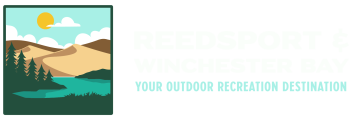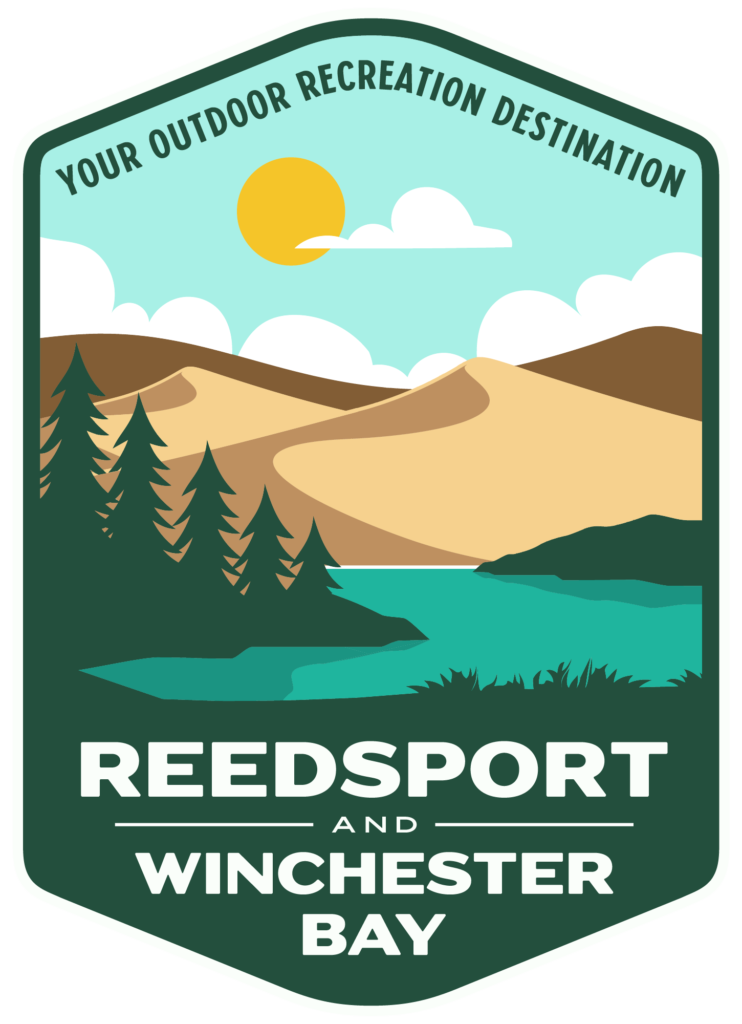REEDSPORT
Reedsport residents often hear the town referred to as the best kept secret in Oregon. That’s because there are so many amenities here that haven’t been discovered by the rest of the world. The area’s rich landscape is a cornucopia of outdoor adventure and tucked just a bit inland. Thus the wind is calmer here than in the neighboring communities of Florence and Coos Bay.
There are hiking trails, the dunes, 40 miles of accessible, uncrowded and undeveloped beach, fishing, boating, crabbing, kayaking, bird watching and much more. But the real difference between Reedsport/Winchester Bay and other small beach towns is the friendly people who make this place “the heart of the dunes.”
The first known settlers here were the Kuuich people. They chose the “neighborhood” for its natural abundance of salmon, lake fish, deer, elk, berries, crab, clams, oysters and mussels. Living on the banks of the Umpqua River (called Tsalila by the tribes) where it meets the ocean offered an endless buffet and a desirable climate.
In 1851 the first American ship crossed the Umpqua bar carrying the Umpqua Exploration Expedition. The vessel sailed as far as Scottsburg, platting town sites up and down the river in the hopes they would develop as gold seekers flocked to southern Oregon. In 1863 Scottsburg had 5,000 residents and was being considered as a site for the capitol of Oregon. Gardiner became a major shipping port in the late 1800’s. Reedsport then began to prosper when the first railroad came to the coast.
Businessman Alfred Reed saw the potential and moved his family here from Elkton, then known as Fort Umpqua. The gold rush of the 1800’s brought people to fill Reed’s town. By 1912 there was a post office, mercantile and builders who had their hands full since the river-area had a tendency to flood. Industrious carpenters built stilts as foundations for homes and businesses, raising the buildings above the mud and allowing the structures to sway with the waters. The riverfront was lined with fish processing plants. Ships pulled up to the docks downtown and unloaded thousands of pounds of tuna, cod and crab. Chinese and Japanese immigrants made their way up the coast and set to work cleaning and processing the fish. A fleet of boats ran from Winchester Bay to the ocean daily.
The woods were overflowing with “green gold” in terms of timber and logging, and good wages brought good living. Through the 1990’s while other beach communities turned to tourism, Reedsport/Winchester Bay remained timber oriented. Then changes in laws restricted logging and fishing. The canneries disappeared. Much of the commercial fishing fleet moved elsewhere. Mills shut their doors.
The community turned to tourism and building a lifestyle for both young families and retirement-age residents. The Umpqua Discovery Center was built to share our “secrets” with visitors. Downtown sidewalks were widened, vintage storefronts became eclectic shops, and visitors found this is a convenient and affordable base for exploration and discovery.
WINCHESTER BAY
There are several reasons people choose Winchester Bay as their destination. It is home to Salmon Harbor Marina, Douglas County’s largest recreation area, where the Umpqua River – known for some of the best salmon fishing on the coast – meets the Pacific Ocean. It is also a crab-lovers paradise. This quaint fishing village is one of the few places outdoor enthusiasts can go and enjoy a variety of activities anytime of the year.
Fishing, crabbing, clam digging, wildlife viewing, hiking, biking, kayaking, surfing and ATV/UTV riding on the tallest available dunes in the country. All of this and more makes Winchester Bay a favorite multi-seasonal getaway. Coastal Douglas County lends itself to romance as well, with spectacular sunsets. The harbor lights glisten off the bay in the evenings.
Winter months provide the best storm watching along the Pacific Northwest Coast. Storm watching continues to grow in popularity as folks come to witness the ocean’s fury as it pounds the coastline. Frequent winter storms whip the Pacific into row upon row of giant waves that crash in spectacular fashion all along the coast. It’s a sight to behold, and a great time to be on the Central Oregon Coast. Beachcombing is best after a good storm as tumultuous seas deposit treasure on local beaches.
The possibilities are nearly endless when it comes to winter or spring-time activities: whale watching, storm watching, beachcombing, and of course crabbing or winter steelhead fishing. Or simply relax, snuggle up with a loved one and your favorite wine or that favorite book you’ve been wanting to read. Come and enjoy the possibilities!
GARDINER
The White City by the sea. Gardiner is a quiet little village now, drawing lovers of history and art with 64 historic structures, 23 area historic sites, an art gallery representing the work of 40 Pacific Northwest artists and a bronze foundry.
But once it was a town of big business and big dreams. The town was named for the Boston merchant who in 1850 turned the cargo of a shipwrecked schooner into the seeds of a community at the confluence of the Umpqua and Smith rivers. By 1851 Gardiner had its own post office and was the headquarters of the Umpqua Customs District. By 1880 it was bustling with Oregon industry: shipping, shipbuilding, a lumber mill, tannery, cannery and creamery.
Pretty white houses dotted the hillside and earned the community the picturesque title of “The White City by the Sea.” In 1908 the cornerstone for the St. Mary the Virgin Episcopal Church – now on the National Register of Historic Places – was laid. But in 1916 fortune changed and the Southern Pacific line bypassed Gardiner.
The church and the pretty houses remain, but piece-by-piece industry has moved on. Gardiner residents invite neighbors and visitors to enjoy an old-fashioned Fourth of July each year with fireworks over the Umpqua River.

